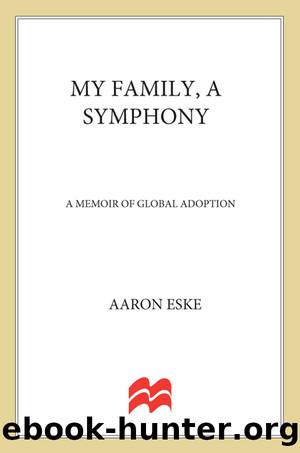My Family, a Symphony by Aaron Eske

Author:Aaron Eske
Language: eng
Format: epub
Publisher: St. Martin's Publishing Group
Published: 2010-01-15T00:00:00+00:00
FOLLOWING A COUPLE OF DECADES of relative peace, the U.S. Air Force dispatched my grandfather, a chaplain colonel, to Seoul in 1977. Although the ceasefire had been declared twenty-five years earlier, the two Koreas were still in a state of war and the U.S. military remained active in the region. A forty-nine-year-old Lenore crossed the Pacific with my grandfather and there, living across from the Korean army bunker, she observed a country in transition. The older Korean men and women still dressed in traditional Korean clothing, but the younger people dressed in the bell-bottomed fashion of the era. Some houses were quite nice, with gates or fences around them. But many people still lived in what she would call hovels made of pieces of metal or cardboard. Most meals were cooked outside the home on hibachis. Cars were small and driving was hazardous. If there were three lanes on the street, six cars would crowd into them.
While they were stationed in Korea, my grandparents met Father Keene, a Maryknoll priest doing Catholic missionary work there. One Christmas Eve service, Father Keene was delivering a sermon about the birth of the Son of God in a rank stable in Bethlehem when he noticed a group of Amer-Asian children standing in the doorway. The children told him they had no home but that they stayed together so they could take care of each other. Father Keene said, âI have a home and you can share it with me.â
When my grandparents visited his home, two Korean women were washing childrenâs clothes in a fishpond in the front yard. Since his Christmas Eve service, Father Keene had welcomed into his care many more children who were abandoned because of their foreign blood. After enduring the twentieth centuryâs foreign suppression and enjoying 500,000 years of genetic seclusion beforehand, Korean society rejected the children of American G.I. fathers even though the babiesâ mothers were Korean. The half-white or half-black children tainted the purity of Koreaâs homogeneous bloodline, its minjoksa, the only thing in their country they still had some control over. The children who unhinged this control were considered non-persons and, in Korean societyâs eyes, deserved death.
When my grandparents told my mother the story of meeting Father Keene while she was in college, she had decided she would adopt a baby Korean girl. So when Meredith started first grade and there was no longer a baby at home, Mom and Dad filled out one more application for adoption. Dad was not an easy sell, but Mom pestered him like an eight-year-old daughter pestering her father for a new puppy and eventually got her way.
On their final application form, my parents repeatedly checked the âYesâ box on the special medical needs form. They still checked âNoâ for cerebral palsy. As history would have it, Yoo Jung Choi, the baby girl the Holt agency referred them, was diagnosed with CP and paralyzed on her left side. Her crawl was more a belly slither as she propelled herself forward with her right foot.
Download
This site does not store any files on its server. We only index and link to content provided by other sites. Please contact the content providers to delete copyright contents if any and email us, we'll remove relevant links or contents immediately.
Machine Learning at Scale with H2O by Gregory Keys | David Whiting(4313)
Never by Ken Follett(3955)
Harry Potter and the Goblet Of Fire by J.K. Rowling(3856)
Fairy Tale by Stephen King(3396)
Unfinished: A Memoir by Priyanka Chopra Jonas(3388)
The Man Who Died Twice by Richard Osman(3077)
Will by Will Smith(2919)
It Starts With Us (It Ends with Us #2) by Colleen Hoover(2367)
Rationality by Steven Pinker(2363)
Can't Hurt Me: Master Your Mind and Defy the Odds - Clean Edition by David Goggins(2341)
The Dark Hours by Michael Connelly(2307)
The Storyteller by Dave Grohl(2236)
Friends, Lovers, and the Big Terrible Thing by Matthew Perry(2230)
The Dawn of Everything: A New History of Humanity by David Graeber & David Wengrow(2208)
The Becoming by Nora Roberts(2201)
The Stranger in the Lifeboat by Mitch Albom(2121)
Cloud Cuckoo Land by Anthony Doerr(2112)
Love on the Brain by Ali Hazelwood(2075)
Einstein: His Life and Universe by Walter Isaacson(2021)
